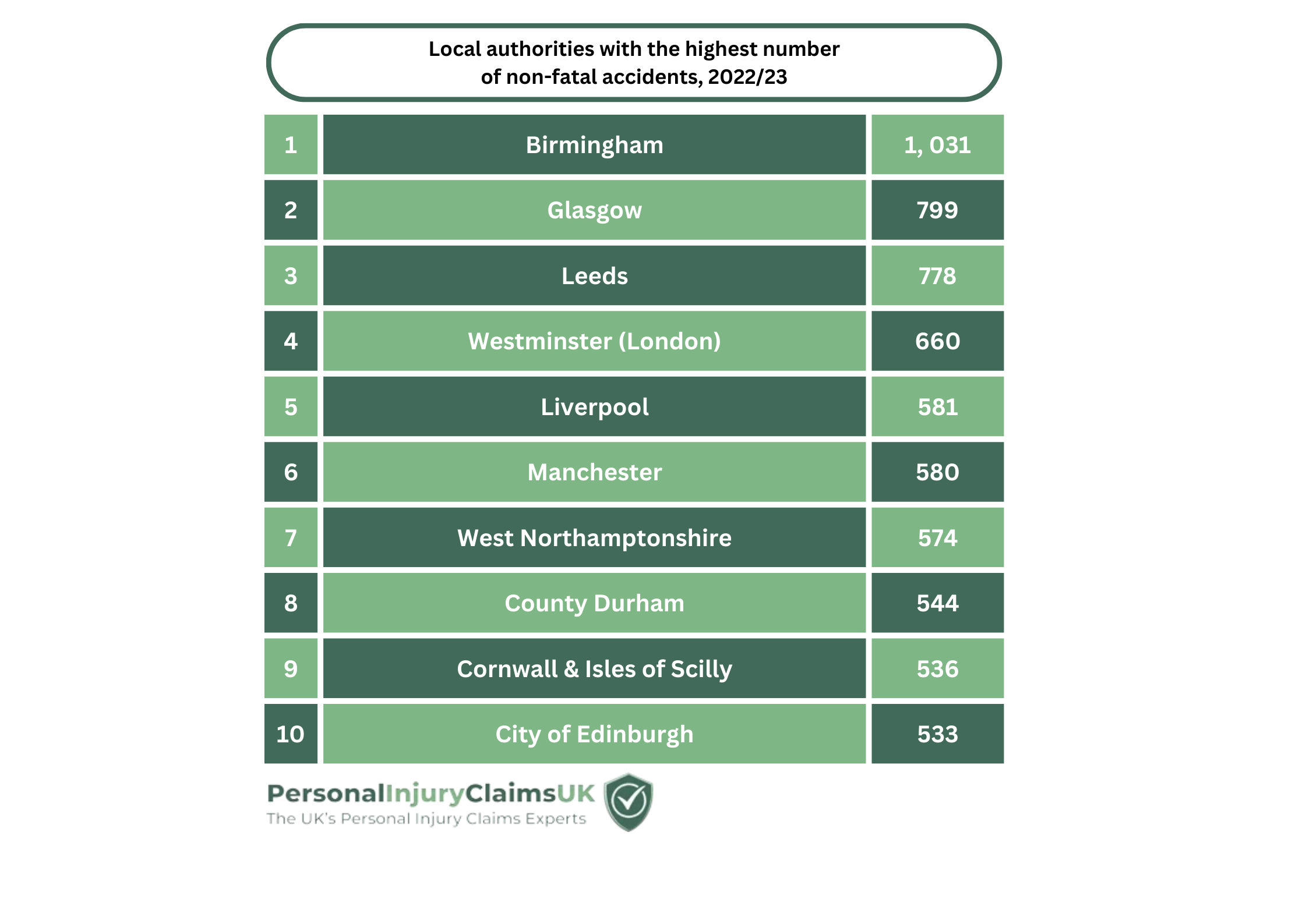If you’ve suffered an injury at work in an incident that wasn’t your fault, you could get compensation by making an accident at work claim. This is to compensate you for the physical and psychological damage caused, as well as potentially any financial losses you’ve suffered due to it.
This guide can help you by answering important questions such as:
- What are the benefits of using No Win No Fee lawyers in the UK?
- How do No Win No Fee claims work?
- What is the accident at work time limit?
- Can I be sacked for having an accident at work?
- How is compensation calculated in workplace accident claims?
Our advisors can help you with any queries regarding all types of accident at work claims, such as wanting to know your eligibility for manual handling claims, which may be related to a lack of adequate training.
You can contact us 24/7 for free legal advice and to get a case check by using the details below
- You can call us if you go to the top of the page.
- Write to us using the Live Chat function on the right-hand side of your screen.
- Contact us via our website.
Read on to learn more about how you could receive injury at work compensation by using accident at work lawyers.
Can I Claim For An Accident At Work?
In order to make an accident at work claim, you need to establish that negligence occurred. But what is negligence?
For the purposes of a work injury claim, negligence is when:
- You are owed a duty of care.
- This duty is breached.
- You are injured as a result.
Under the Health and Safety at Work etc. Act 1974 (HASAWA), your employer owes you a duty of care. This means that they are responsible for your health and safety and have to take all reasonably practicable steps to keep you safe while working.
For example, if your job involves manual handling, your employer should provide adequate training. If they fail to do so, and this causes you to suffer an injury, this is negligence.
To find out if you could claim for an injury in the workplace, get in touch with our team of advisors today. They can assess your claim for free and could potentially connect you with a solicitor from our panel.
How Do Accidents At Work Happen?
By law, your employer has a duty of care to reduce the risks of you suffering harm to the lowest level they reasonably can.
If they fail or breach this duty and you suffer an injury, it could be considered negligence.
Your employer breaching their duty of care would mean that they have not adhered to the required safety protocols to keep employees safe.
An employer’s duty of care is detailed in the following legislation:
- Health and Safety at Work etc. Act 1974
- The Control of Substances Hazardous to Health Regulations 2002 (COSHH)
- The Provision and Use of Work Equipment Regulations 1998
- Section 4 of The Health and Safety (Miscellaneous Amendments) Regulations 2002 is an amendment to The Manual Handling Operations Regulations 1992.
- Learn about the Health and Safety Executive (HSE) and whether you can make a complaint to them after being injured at work.
Examples Of Accidents At Work You Could Claim Compensation For
- Slipping on a wet floor because there were no warning signs displayed, despite the spillage being noticed by staff. Or you may slip and fall on ice around the workplace which could have been cleared with measures such as gritting. Head here to learn more about slips, trips and falls at work.
- Manual handling accidents caused by lifting and carrying items that were too heavy.
- Tripping on exposed wiring because the employer didn’t check it was secured properly. Or there was inadequate lighting and you were unable to see it.
- Falling from a ladder due to using faulty work equipment that the employer was aware of.
- Accidents involving a forklift in a workplace, which could occur particularly in warehouses or factories.
- A trip and fall accident or an accident involving heavy equipment at a construction site could cause various common injuries. Head here to learn more about construction injury claims.
What Are My Rights After An Accident At Work?
Suffering an injury at work is stressful and painful enough without having to worry about defending your legal rights too. That’s why it can help to understand what rights you have, especially in relation to an accident at work.
The most important right to keep in mind is that you cannot be sacked for having an accident at work or suffering an injury. There is an exception to this which we discuss in the section below.
Some other rights include:
- The right to report the incident and record it in the accident book
- The right to receive medical treatment. This could be a first aider on site or it could be treatment from a hospital or walk-in centre
- The right to Statutory Sick Pay (SSP). Not all employers pay sick pay. Some might offer it for a set number of days, some might not pay it at all. However, everyone is at least entitled to SSP.
If you work part-time you have the same rights as a full-time member of staff.
Temporary or agency workers may have differing contracts of employment, but if you’ve suffered an injury while employed this way you can still make an accident at work claim.
To learn more about your rights after an accident at work, head here to check out our dedicated guide.
Can I Be Sacked For Causing An Accident At Work?
If you caused an accident at work due to your own negligence, there is a chance that you could be sacked, especially if the accident inflicted harm on other people.
If you were only partially responsible, there is a chance that you could keep your job.
It’s best to check your contract of employment to see what this states in the event that you cause an accident at work.
How Can I Prove My Injury At Work Claim?
Evidence that you could use in an accident at work claim includes:
- Photographs – these could show the cause of your accident, such as a broken machine, or the scene of the accident
- Witness statements – obtaining the contact details of anyone who saw your accident is very important. They could provide a statement that backs up your version of events
- CCTV footage – this can be especially useful if it shows the accident happening
- Medical notes – if you went to the hospital after your accident, any paperwork you were given could also be useful
- Proof of financial losses – if you have lost money because of the accident, such as your salary or if you had to pay for prescriptions, you can claim this back if you have receipts.
The more evidence you’re able to provide, the stronger your compensation claim could be.
For more information about how to claim for an injury at work, such as your rights and how to get in touch with accident at work solicitors, please contact us
Frequently Asked Questions (FAQ)
If you still have some questions about making a claim for an injury at work, our detailed FAQ section may help. And if you still have a query, please get in touch with us on the number at the top of this page.


